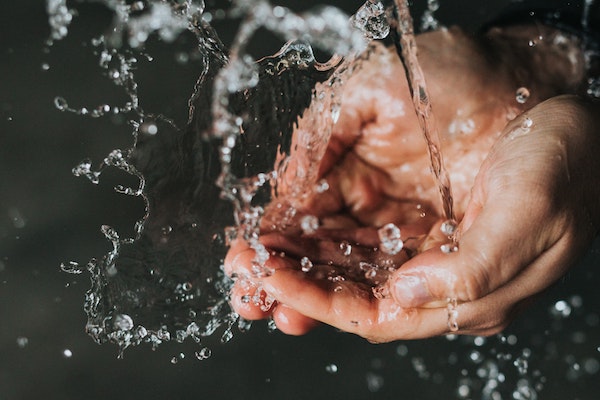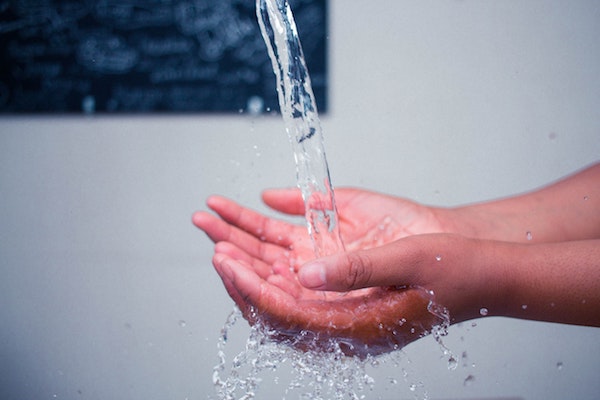Washing your hands frequently is one of the best ways to avoid contracting COVID-19. Your hands come into contact with all kinds of stuff during the day and you will eventually touch your face at some point. This will possibly allow the virus to enter into your body. Check the recommendations from the World Health Organization on how to wash your hands properly.
However, washing your hands so often can also lead to severe skin dryness, depending on the sensitivity of your skin. Regardless, such frequent washing will strip your hands of their natural oils, which help keep them supple and healthy. Using hand sanitizer regularly will exacerbate the problem and you may even notice resurgences of other skin conditions like eczema.
As washing your hands less certainly isn’t an option, we’ve put together a simple list of things you can do every day to ensure your skin doesn’t dry out.
#1: Wash your hands with cold water
Many people wrongly think that hot water is more effective at killing germs. However, unless you’re dipping your hands in boiling water for a few minutes, it doesn’t make much of a difference. Cool or cold water works just as well at cleaning your hands, so it’s better to go with that.
Hot water opens your pores up and disrupts your skin’s balance, causing it to dry out more. Whereas cold water is generally much kinder to your hands. And as long as you wash your hands for at least 20 seconds, you’re certain to clean them as efficiently.
#2: Use a moisturizing soap
The quality of the soap you use is especially important when you use it so frequently. One that strips more of your skin natural oils is only going to cause you to have drier skin. Look for soaps that are focused on rehydrating and moisturizing skin so that despite the number of times you’ll wash your hands per day, you will still prevent your skin from drying.
#3: Moisturize regularly
Since you have to wash your hands so regularly, it’s important you moisturize them regularly too! Just a moisturizing soap is not enough though. A good moisturizer will help replace the natural oils stripped away so that your skin can stay smooth and hydrated. Opt for moisturizers with more natural products, or those that focus on rehydrating skin.
Be sure to dry your hands completely before applying the moisturizer, to get rid of all the dirt and germs! Plus, applying moisturizer on damp or wet hands will cause these germs to spread over your hands and proliferate more. Also avoid touching the nozzle of your moisture to reduce contamination risk. It’s actually best to stick to your own moisturizer to avoid infecting someone’s else or getting collecting germs yourself.
Some tips on the types of moisturizers you should look for to best protect your skin (non-exhaustive list):
- Occlusives – This includes ingredients such as mineral oils, paraffins, lanolin acid, stearic acid and squalene
- Humectants – sodium pyrrolidine, lactate, urea, glycerin, honey, sorbitol
- Emollients – dimethicone, cyclomethicone, octyl octanoate
Those with extra sensitive skin will likely benefit from using skin balms to protect skin that’s already dry and cracked. Simply apply them to the affected areas, including sores, red and itchy areas. Also, it’s best if you wear gloves when handling harsh products such as dishwashing soap.
#4: Treat yourself
Depending on where you are, it may not be possible for you to get a manicure so that you can professionally pamper your hands. However, you can certainly treat your hands well at home! All you need is a good quality moisturizer and a pair of gloves.
Apply a thick layer of the moisturizer on your hands. Then, put your gloves on – wool or fleece gloves are the best for this as they will ensure the moisture works on your skin. Keep them on for at least 20 minutes, or even overnight to benefit from more pronounced effects. Then, wash the moisturizer off. Do this on a regular basis – at least once a week or whenever your skin begins to show signs of dryness.
#5: Avoid microabrasions on your skin
Microbrasions are microscopic scrapes of the top layer of the skin that can cause significant damage over time. There are two main ways to avoid microabrasions, the first is to keep your nails short and neat. Long nails means you are more likely to cause microabrasions on your skin when you wash them or accidentally scratch them – even a light scratch can damage your already delicate skin. Plus, long, untrimmed nails are a magnet for dirt and germs. Throughout the course of the day, these germs will likely travel to all parts of your hands and possibly even the rest of the body – putting you at more risk of getting COVID-19
Another way to avoid microabrasions is to use paper towels to dry your hands as they are softer than regular hand towels. The rougher texture of hand towels can act as an exfoliant for your skin and remove the top layer, thereby exposing the lower layers of your skin and dehydrating them. If paper towels are not an option, it’s best each person in the house has their own hand towel made of a soft material so that you avoid cross contamination. You should also regularly handwash your towel with a mild detergent to keep it clean without compromising on its softness.
Since washing your hands regularly is of paramount importance when it comes to the battle against COVID-19, there’s no way around it! However, the above 5 steps will certainly mitigate the damage done to the skin on your hands from frequent washings.


